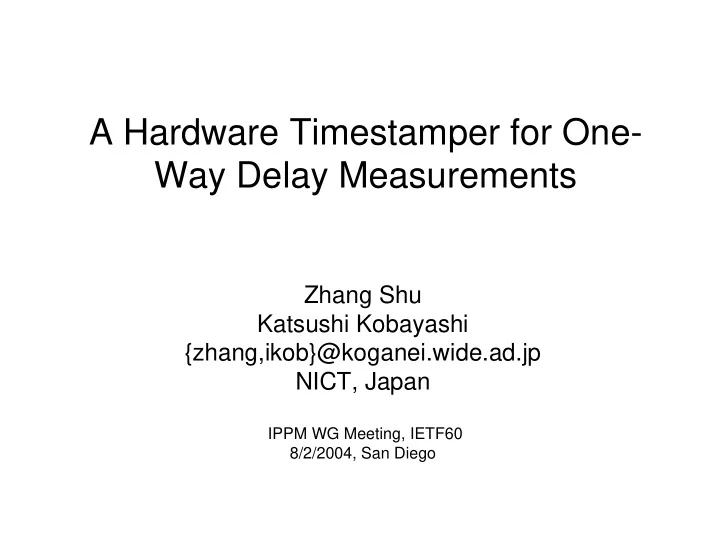

A Hardware Timestamper for One- Way Delay Measurements Zhang Shu Katsushi Kobayashi {zhang,ikob}@koganei.wide.ad.jp NICT, Japan IPPM WG Meeting, IETF60 8/2/2004, San Diego
Overview • Why using hardware timestamper? • Features of the hardware timestamper • Measurements • Summary
Why This Hardware Timestamper? • We need more accurate timestamp for high-precision measurements, however, – Error of timestamp based on NTP can be several ms, or even worse when asymmetric routes are used – We can directly connect the measurement system to external time source (e.g. through RS232C), but the precision is still subject to software overhead
An OWAMP-Compliant Hardware Timestamper • Features – PCI POS NIC (OC3/12) – Generates timestamps when sending or receiving a UDP packet • Supports both IPv4 and IPv6 • The timestamp conforms to the format of OWAMP test packet • Currently only supports test packets in unauthenticated mode • Only generates timestamps for UDP packets using a specific port number, which is configurable – The clock can be synchronized with external time sources Accuracy HP 58503A TymServe • Two kinds of signals: 1PPS,10MHz 2100 – Used external time sources 1PPS <110ns <2us • Symmetricom TymServe 2100 10MHz 1x10^(-12)s 48ms/day and HP 58503A /day • Both use GPS signal as input
Sender Behavior OWAMP test datagram (with sender timestamp cleared) OWAMP application User ground Kernel TCP/IP stack and driver routine POS frame header IP header UDP header Generate and insert timestamp Hardware processing Fix UDP checksum
Receiver Behavior • When a packet arrives at the interface, it – Generates a timestamp (hardware) – Inserts the timestamp – Clears UDP checksum – Passes the packet to upper layer Seq Number Sender Timestamp Sender Error Estimate Receiver Timestamp
Measurements Using the Hardware Timestamper • Four kinds of OWAMP test packets used – IPv4, v6 packets with 64-byte, 1400-byte payload – One packet per second is sent for each type Topology of the measured network cisco7206VXR M20 Procket8812 M10 cisco7206 30KM 900KM Tokyo PC1 OC3 POS PC2 100Base-T Ethernet NICT Fukuoka Global Ethernet
Measurement Results (Cont’d) 7/ 27 IPv4, 64 bytes In most time, the one-way delay is around 10.7ms.
Measurement Results 7/ 27 IPv6, 64 bytes • More measurement results are available at – http://pe2.koganei.wide.ad.jp/cgi-bin/owd-stat – http://qpe.jp.apan.net/cgi-bin/owd-stat
Summary • A hardware timestamper which generates high- precision timestamp for OWAMP test packets • It can be used in other OWAMP implementations with a few modifications – Specify port numbers of test packets in both the sender and receiver side – For receiver, use the hardware-generated timestamp when calculating one-way delay • If the WG decides to publish an implementation report of OWAMP, we would like to contribute
Recommend
More recommend